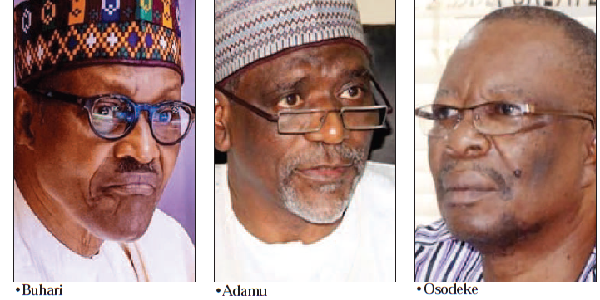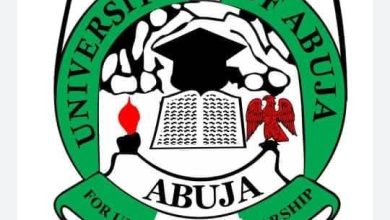How Buhari rejected ASUU’s demand for six months salaries

President Muhammadu Buhari opted to invoke the no work, no pay policy against striking university lecturers on Thursday after receiving the status report on the negotiation with the Academic Staff Union of Universities (ASUU) from Education Minister Adamu Adamu.
The President was shocked that the lecturers have reduced their demands to only the payment of their six months’ salary arrears, The Nation learnt yesterday.
Buhari was also said to have been angry that the lecturers were still grumbling after the government accepted to increase the salary of professors by 35 per cent and other lecturers by 27 per cent.
Sources said yesterday that ASUU also rejected the increase of the pay of Chief Lecturers in Polytechnic and Colleges of Education by 35 per cent.
It was said to have queried the alleged unilateral increase by the National Salaries, Incomes and Wages Commission instead of allowing the principle of collective bargaining between the Federal Government and the union.
Investigation revealed that when the Minister of Education went to brief the President on the status of negotiation with ASUU, he had the impression that the striking lecturers were only after their salary arrears without caring about other demands.
A top source said: “Immediately Adamu presented a request for the payment of the salary arrears of the lecturers, the President said no. He couldn’t understand that the lecturers wasted the career of a young generation for six months.
“He didn’t believe that all the lecturers wanted was salary arrears and not much of other demands, including the revitalisation of universities.
“He was disturbed that the lecturers were not comfortable with 35% salary increase for professors and 27% pay increase for other lecturers.”
Another source said: “The President was asking how students would get justice if the lecturers were paid their salary arrears for doing nothing.
“He also got to know that four out of the five striking unions in the tertiary institutions have agreed to call off their strike except ASUU. He has evidence to show that his administration has released huge funds to the universities among other reforms. He was not happy that ASUU was not reciprocating the positive strides.
“He directed the minister to invoke the no work, no pay law to enable the lecturers appreciate the enormity of the setback they have caused for the university system.”
Responding to a question, the source added: “Only God saved Adamu, the President would have removed him as minister.
“There had been intelligence report on Adamu that he has been indulging the ASUU leadership. In fact, varsity lecturers have always wanted to negotiate with him than the Minister of Labour and Employment, Dr. Chris Ngige.”
Sources said once the minister read the mood of the President on Thursday, he wasted no time in obeying his directive .
“That was why Adamu chose the Presidential Villa to address the press on Thursday to announce the government’s position,” one source said.
Academics advocate liberalisation of university unions
A group of academics – Congress of University Academics (CONUA)- yesterday called for the liberalisation of academic staff unions in universities across the country.
This, it said , would give lecturers and other stakeholders the freedom to choose which body they want to belong to and also put an end to the endless strikes embarked upon by the Academic Staff Union of University (ASUU).
The congress said the current ASUU strike might not yield a positive result.
Speaking at a press conference in Abuja, the National Coordinator of CONUA, Dr. Niyi Sunmonu urged the Federal Government to approve its registration which has been pending since 2018.
Sunmonu said CONUA was “saddened by our recent experiences in Nigerian universities… unprecedented disruptions in academic calendars in our universities.”
He said: ”Between 1999 and 2021, Nigerian public universities experienced strikes for 1,417 days which translates to over five years.
“The ongoing strike is in its sixth month now. This has caused damage in no small measure to teaching and research.”
On the way forward, he said: “CONUA is determined to proffer solutions to these endemic problems so that our universities once again will have a breath of life.
“As a first step, we call on the federal government, as a matter of urgency to convoke a stakeholders’ meeting to include parents, students, all unions and relevant government agencies to brainstorm and find lasting solutions to these perennial problems.
“We cannot be doing the same thing the same way for many years and expect different results. As a union, we are committed to the entrenchment of quality ideas that will stand the test of time in Nigerian universities.”
Stakeholders: Enough of this dispute
Some Nigerians are not in agreement with the Federal Government on its decision to invoke the no work, no pay law against the striking lecturers.
They are of the view that the university system and the students have suffered enough over the strike and government should just pay the lecturers so that academic work can resume immediately.
Former lawmaker, Senator Shehu Sani who represented Kaduna Central in the 8th National Assembly, asked the Federal Government to set aside the extant law of ‘no work, no pay’ and pay the striking universities lecturers their six months’ salary areas.
Sani said both the federal government and ASUU should not be talking about law, but negotiations and compromises now, especially that students who he said are at the receiving end have lost one academic session.
His words: “First of all, it is a fact that there is a law on ground which justifies no work, no pay. But the issue is that, at a time like this, we are not talking about law, we are talking about compromise and negotiation.
“It is important that the two parties should be conscious of the fact that the consequences of this crisis is impacting more negatively on the future of the students and our young ones in the universities.
“So, when there is a matter of negotiation, there is need for compromises and even if the payment of the areas of ASUU members will help in ending the strike, let them be paid.
“What matters now is how do we solve the problem? Especially that the students have lost a full academic session. So, compromise can come at a price of anything.”
Human rights activist in the Niger Delta, Comrade Alagoa Morris, said the Federal Government stood to gain by conceding to the demands of the ASUU.
Morris, a former Secretary of Civil Liberties Organisation (CLO), advised the Federal Government to keep ego aside and bring the strike to an end in the spirit of “No victor no vanquished”.
He said: “We are, unfortunately, in a clime where the government would cave in to demands of faceless and unregistered groups simply because such groups are bearing arms.
“When juxtaposed with recognised and registered organisations like ASUU with known and identifiable individuals who are academics, it sends wrong signals.
“Unless the public educational institutions are to be deliberately destroyed for the private ones to thrive in the country and mostly because children of politicians are either in those private schools or abroad, then it is understandable and unfortunate.
“The ivory tower in this country ought to compete favourably with others anywhere in the world. It is a shame that Nigerian universities are ranked low even in Africa. If we must raise the mark, then the federal government should do the needful by meeting up with ASUU in the interest of the educational wellbeing of this country.”
Chairman, Anambra Civil Society Network (ACSONET), Prince Chris Azor, called for a middle ground between the Federal Government and ASUU in the interest of students and their parents.
While advocating for installment payment of accruing salaries and emolument of the lecturers, Azor called for sacrifice on the part of ASUU members by making up for lost period of time.
He said:”My people have a saying that if you’re preparing a cure for poor vision, you shouldn’t be adding pepper to the mix.
In all fairness, if you want a solution, don’t create another problem.
“The accruing salaries and emolument could be settled by installments. However, I plead with ASUU to take a first step by calling off the strike. They may be gradually losing the gained empathy and sympathy, if they continue with this uncompromising stance.”
A cleric, Pastor Chijioke Nwokeke, described the strike as ASUU’s legitimate weapon in fighting for its course, stressing the need for President Muhammadu Buhari to have personal audience with the lecturers.
He said, “Both the Federal Government and ASUU need to make a little compromise for the sake of the students and the nation at large.
“The strike embarked upon by ASUU is a legitimate weapon in fighting for their cause, so it is very wrong for the federal government to say that they are not going to pay the lecturers for the period of time they have been on strike.
“The arrogant manner in which the Minister of Education Adamu Adamu is going about the whole issue is going to worsen the whole matter.”
A veteran journalist, Tony Okafor justified the federal government’s no work no pay position, but said such a decision was not applicable in the current circumstance in view of federal government’s unfulfilled agreement with ASUU.
He said, “In my opinion, the Federal Government is correct to say it won’t pay ASUU for the six months they are on strike. Strike simply means temporary withdrawal of services to an employer by an employee. An employee who fails to show up for work, regardless of the reason, is not entitled to pay.
“When you withdraw your services, you don’t come back to request for payment of the time foregone. The frequency of strikes in this part of the world is nauseating and should not be allowed to continue for any reason.
“But in this case, because of the circumstances of the strike and our children, justice should be tampered with mercy. The strike was an overflow of the 2009 Federal Government’s agreement with ASUU which was not fulfilled for over 13 years. This is not an honourable path by the Federal Government.
“The two parties in this case have erred and fallen short of all expectations of credibility test. So, the lecturers should be paid their arrears that accrued because of the strike so that they will go back to classes and learn their lessons from there.
For Nonso Orakwe, Executive Director, Catch Them Young Community Initiative,the ”no work, no pay” policy is morally wrong, insisting that the federal government should go ahead to settle the lecturers.
“As a matter of fact, if billions of naira can be embezzled by an individual in this country, there’s no moral justification for FG to put in place “no work, no pay” for ASUU. FG should borrow and fix education in Nigeria. FG should pay lecturers for 6months they have been on strike and shun excuses.
The National Chairman, EFAC Nigeria National Convention and Anglican Bishop of Aguata, Anambra State, the Most Rev.Samuel Ezeofor, and Ven. David Ezeobi, appealed to the Federal Government and the Academic Staff Union of Universities ASUU to shift grounds on the lingering strike to save the students from further sufferings.
According to them, the strike had led some of the students to some crimes that could have been avoided.
Bishop Ezeofor and Ven Ezeobi, told The Nation Friday in Awka, that the Church had already been in prayer session over the strike.
The Prelate, however, blamed the government for showing lukewarm attitude towards the ASUU demands, thereby, punishing the students who he said, were leaders of tomorrow.
He said, some of them who were to graduate would have stayed longer than necessary, which is why most of them had taken to some crimes.
For Ven Ezeobi, “if I were in the shoes of the Federal government, I would pay ASUU for them to go back to the classes and save Nigeria further embarrassment “
A chieftain of the All Progressives Congress (APC) in Enugu State, Prof. Obasi Igwe, described the policy of no work no pay by the federal government as an attempt to finally cripple the education system in Nigeria.
Igwe said, “ASUU is making a legitimate demand. The federal government cannot be asking its victims (lecturers and students) to fix the problems it(federal government) created.
“Federal government should not deprive ASUU members of their salaries because they are making a very legitimate demand and they should not be denied their legitimately earned income.
”I say this because when the strike is on, the lecturers are still embarking on research for the good of the country. They don’t abandon their research. And lecturing students is not the only thing the lecturers do. So, it is only a government that doesn’t understand the work of a lecturer that will declare no work no pay when lecturers are on strike.
An education activist, Comrade Paul Osochi berated the Minister of Education, Adamu Adamu over the inability of the federal government and members of the Academic Staff Union of Universities (ASUU) to resolve issues delaying resumption of academic activities in the universities across the country.
Also speaking, the chairperson of ASUU, Abia State University (ABSU) chapter, Dr. Victor Nkemdirim said “the only thing that we have not done 100 percent is teaching.
“We are employed to teach, research and do community service. If we are not found in the class teaching, does it mean that we have not taught? “A” starts from 70 marks. If somebody scores 70, has he not made an “A”?
“Labour matters are in the Executive List. The strike that we embarked upon is very legal and it is aimed at pressing on our demand to make the government do the needful.”
The Acting National Chairperson, Socialist Party of Nigeria, SPN, Bamigboye Abiodun expressed shock at the stand of the Federal Government saying the move wrongly suggested that the lecturers had not been working for the period of the strike.
He said it was wrong for the government to make such a move saying teaching is just one of the three things university lecturers are paid to do.
A human and environmental rights activist in Benin, Edo State, Kola Edokpayi, faulted the decision of the Federal Government and said it should be rescinded immediately for the lecturers to return to the classrooms.
A retired academic, Professor Jim Omatseye, asked government to pay the striking lecturers ..
According to the Professor of Educational Philosophy, ASUU is justified in demanding for the six-month pay.
“I believe that ASUU should be paid for the time they’ve been on strike because they have a very good reason for the time they’ve been on strike,” he said.
“Federal Government reneged on its agreement with ASUU and ASUU insisting that they must carry out their part of the agreement is a justifiable reason for being on strike.
“Because the matter is being resolved, the government should actually pay for the period they’ve been on strike.
“The so-called ‘no work, no pay’ policy is not one that should hold in this matter because the guilty party has to pay for something and the government is the guilty party in this matter. Therefore, they should pay the workers,” Omatseye said.







